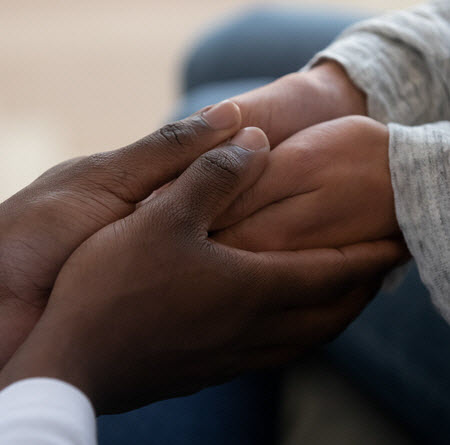“The real purpose of a relationship is about two people coming together to serve the growth and evolution of each other’s soul.”
–Kute Blackson
 Relationships: They can be among the hardest parts of life.
Relationships: They can be among the hardest parts of life.
Are you arguing over small things while major issues continue to be ignored?
Have you reached a point where you feel like little more than a roommate to the person you were head over heels in love with years before?
Or are you avoiding home altogether… instead of focusing on work, friends, or the kids to distract you from facing issues that have built up over time?
Maybe you just want more out of the person with whom you’ve chosen to stay forever?
Or this your first serious relationship, or even same-sex relationship, and you just feel a bit lost?
Infidelity, toxic dynamics, lack of emotional or physical intimacy, and growing apart: They’re common relationship problems that we all face… no matter if you’re gay, straight, polyamorous, polygamist, or something else!
The consequences of unfulfilling, toxic, or failing relationships…
As social beings, we have deep-rooted needs to connect with others. It’s entirely natural that we want and need certain things from our relationships: acceptance, approval, intimacy, validation, compassion, empathy, belonging, and love.
When emotional needs go unmet, you may try to substitute these to trick yourself into feeling like things are okay.
Instead of emotional or intimate conversations, you tell yourself, “Oh guys, just aren’t that deep
anyway,” as you turn towards your friends more and more.
Instead of asking for more quality time, you tell yourself, “They work hard and are a good
provider, I can handle some alone time.”
Instead of sex, perhaps you’re substituting food, alcohol, flirting with others, or convincing
yourself, you just don’t need it that often.
Instead of solidifying your identity, you start to feel yourself fade away while maybe your partner shines, losing who you are and struggling to find space for both of you.
Instead of speaking about hurts, frustrations, intimacy, and connection, you bite your tongue and slowly start to pull away, maybe diving into work or others as a distraction.
Instead of spicing things up or taking new adventures, you tell yourself, “I like the consistency and routine. It’s okay that we never do anything new.”
You fight about the dishes, your mother-in-law, the kids, finances, but all you’re really looking for is to feel heard, to connect, and to be seen by one another.
Seething anger and resentment may have turned into painstaking apathy and indifference.
Maybe you have reached the point of no return, finding that staying in the relationship is stifling you, worsening your mental and emotional health, or compromising your quality of life.
 Couples therapy is a good idea… no matter your relationship stage or status.
Couples therapy is a good idea… no matter your relationship stage or status.
When you’re considering marriage…
It’s a beautiful thing when two people commit to sharing their lives, but few consider starting with a sound foundation.
Even if things seem to be going well and you’re both excited for the new chapter you’re starting, it can still be beneficial to check-in and get some skills to make the most of all that lies ahead.
You’ll learn how to identify ineffective patterns, increase intimacy, release the baggage of the past, set boundaries, and clarify what marriage means to you.
When you’re in the “honeymoon” phase…
Everything seems enjoyable, new, exciting, and happy. Are you putting your most authentic self forward? Is your partner?
Have you noticed some red flags but told yourself they’re not a big deal and forged ahead anyway?
The honeymoon phase can often be the most difficult because people yearn for when things go stale, get hard, or grow too comfortable.
Creating an authentic and honest honeymoon phase doesn’t have to take away the joy and excitement. It can be about building deep emotional intimacy that will carry through the rest of the relationship.
When handled effectively, the entire relationship can feel like a honeymoon phase, creating satisfaction and fulfillment at any age or stage, and reducing longing for what once was.
When you experience your first fight…
All relationships have minor squabbles. Don’t come into therapy the first time the two of you are hangry and can’t decide where to eat.
When there is the first major presenting issue, it’s helpful to have an objective third party – arguing about family, the future, personal values, and beliefs, or situations that led to one or both of you feeling shamed by the other.
Therapy at this stage highlights differences in values, communication breakdowns, and learning how to interpret one another.
When you have prolonged fights and unresolved issues…
Without realizing it, many issues stem from your family of origin, and as you work to build your own family, these are triggered.
Yes, we all carry baggage from our pasts. Yes, the older you are, the more you have to sort through if it’s never been addressed. Yes, it is affecting your relationship.
The good news is that these issues can be addressed without having to end a relationship.
Many couples fight over some of the same issues repeatedly. This may be because you or your partner have deep-rooted values and core beliefs you’re struggling to let go of or because you aren’t sure how to move past something in a relationship.
We will explore all of this and more to help you and your partner create a more fulfilling relationship with less fighting, less tension, and a greater understanding of one another and the relationship as a whole.
 When you want to connect emotionally or physically…
When you want to connect emotionally or physically…
You may not see any glaringly obvious issues within the relationship but want more out of it, out of your partner, out of your life together.
Relationships are supposed to change us over time for the better, but this can really only be done when we are challenging ourselves and our partner(s) mentally and emotionally, which often leads to a greater physical connection.
Don’t just brush off your partner as “not being that emotional,” because chances are they don’t know how to be and don’t get the chance when you dismiss them.
No one is taught how to connect with another person emotionally. It’s okay to come in and get skills on how to foster intimacy and let someone into your inner world.
When there is greater emotional intimacy, physical intimacy tends to become more fulfilling and satisfying, as you learn how to express your love physically.
When there has been infidelity or an affair…
If you’re in this category, you may question if it’s even worth it to fix your relationship. You don’t have to decide one way or another right now.
You can start with either just yourself or both of you to assess where you are and clarify goals.
If you both want to repair the relationship, I’ll guide you on addressing what has happened, the impact it has had, what has been lost, and how to recover.
Affairs change people, changes relationships, but this doesn’t always have to mean for the worse. Let’s explore and open the wounds to learn what will heal them.
When you’re making a last-ditch effort to save the relationship…
Perhaps you’re seeking a safe space to inform your partner of your decision and need support. You may even be seeking a “last-ditch attempt” to save your marriage or relationship.
Perhaps you’ve tried everything you can think of: date nights, new tricks in the bedroom, gifts, vacations, relationship workshops, and nothing seems to have made any lasting changes.
Most couples come in frustrated at this point. Usually, it’s because one or both people don’t know what they want, which is their Hail Mary.
Together, we can clarify what caused this – the issues went unresolved, how both of you have grown individually, and where that leaves the relationship.
Just because things may feel over or that it’s too much to come back from doesn’t mean this is the case. And if it is, well, that’s what the next part is for…
 …When you know you’re going divorce and want to do so amicably…
…When you know you’re going divorce and want to do so amicably…
You may come in already knowing that it’s best to go your separate ways, but you don’t know how to do it effectively – especially if there are kids involved.
Divorce doesn’t actually have a significant impact on kids, especially if staying together causes more tension and unrest in the household. It’s how couples handle separation/divorce that creates issues for children.
You don’t have to be furious with your partner or hate them to leave them, although unfortunately, people get there. It’s okay to leave even if things are ‘okay,’ you just may have grown apart or wanted different things out of life.
There are amicable ways to end romantic relationships, but this involves getting closure and processing pent-up resentments and hurts so they don’t come out in destructive patterns in the future.
While the goal isn’t always to stay the best of friends, it is meant for both parties to move forward in their lives without feeling as though things were not dealt with, were left unsaid, or fearing that it would somehow interfere with life in the future.
Let’s talk more about what we’ll do together…
Sessions are mostly held with both/all partners, but there may be times where I must meet with each of you one-on-one to gain a clearer understanding of your personal background.
For instance, if either party is suffering from mental health issues or has endured significant trauma in the past, that may contribute to the relationship’s challenges and clarify each person’s goals.
Within relationships, people often fall into a particular dance with one another, and the steps become routine. As dreadful as arguments are, these may be the only moments you can say how you feel, or this may be the only way to release pent up frustration.
People often get stuck in this dance, knowing when to step right or shimmy left to get what they want – because it does something for them, it meets needs.
My job is to help you create a more effective rhythm that still meets those same needs…
… talking without fighting, releasing tension without yelling, and taking criticism or feedback without stepping away.
The goal is to create a fulfilling dance for both of you, allowing for new patterns, new steps, and new movements that don’t become so stale or monotonous.
To do this, I use several approaches. One is to assess goals, problems, and perspectives through speaking with each person. The other is to have you work through some tasks to see how you interact with each other, communicate, and what the steps are in your dance. It can be hard to verbalize these as you may be so entrenched that you don’t see them. I find blind spots and highlight what’s ineffective and how to change this.
I’ll also help you and your partner build a firm foundation by better understanding one another and learning more about each other.
You’ll be given homework exercises to do both together and separately. We will go over these and discuss findings and process revelations. I’ll help you learn how to turn towards each other instead of away, how to share fondness and admiration, how to argue constructively, and ultimately how to build dreams and create shared meaning together.
Along the way, you’ll have opportunities to make repairs, grieve losses, resolve issues, and release any suppressed thoughts or feelings. You’ll gain a clearer understanding of yourself and your values and wants, as well as your partner’s.
If you’re looking to end the relationship, I’ll guide you both toward closure and help you both take your final bow. It’s easiest to walk away with a sense of gratitude and respect for the dance and your partner than to carry resentments and grudges into your next chapter.
 It’s never too late or too early to start.
It’s never too late or too early to start.
I’m sure you’ve tried with all your might, but you just can’t seem to resolve your relationship issues. It’s okay to ask for help.
I know that these can be painful experiences, and it takes courage and vulnerability to address them – to pull back the blindfold and start healing.
It’s time to confront the pains of the past and create a new chapter for you and your partner.
I know this is what you’re looking for, so give me a call and let’s discuss where you’re at and how I can help you get to where you want to be: (561) 578-3058.

